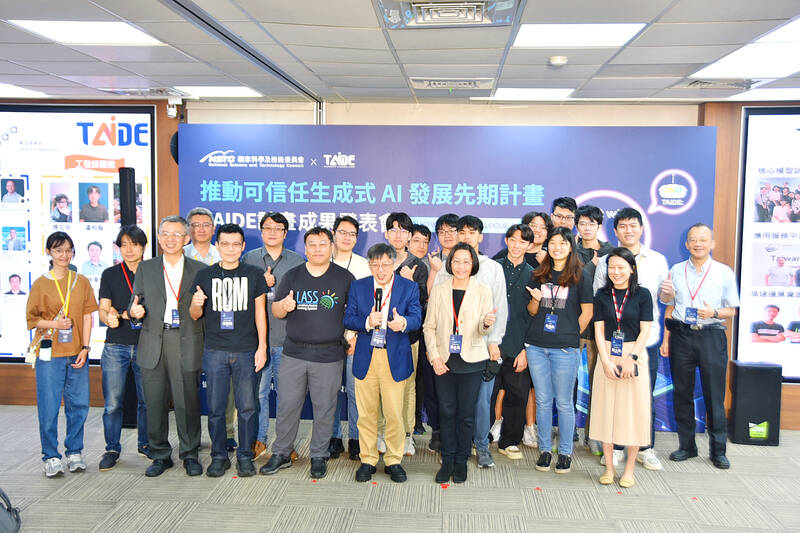A presentation yesterday on Taiwan’s self-built language model TAIDE, released commercially on April 15, showed the many fields it can be applied to, from language learning and agricultural knowledge searches to banking customer service.
The project to develop TAIDE, which stands for Trustworthy AI Dialogue Engine, was initiated by the National Science and Technology Council (NSTC) in April last year to create a foundational model for a traditional Chinese generative AI dialogue engine specifically for Taiwan.
The NSTC has collaborated with several institutions on the project over the past year, and a number of them appeared at yesterday’s presentation in Taipei to promote the system and demonstrate some of its applications.

Photo: Wu Po-hsuan, Taipei Times
For example, a team from the University of Tainan, led by computer science and information engineering professor Lee Chang-shing (李建興), developed a Taiwanese Hokkien-English AI chatbot for elementary and junior-high students based on TAIDE to learn the languages.
National Chung Hsing University has created an agricultural knowledge search engine called “Divine Farmer TAIDE” that can answer professional agricultural questions with citations, said Fan Yao-chung (范耀中), an associate professor of computer science and engineering at the university.
He said the answers generated through “Divine Farmer TAIDE” are more “context-based and detailed” than an engine the team previously developed based on ChatGPT because the new model includes reports from the Ministry of Agriculture in its database.
Taiwan Business Bank, in collaboration with an AI company, has applied TAIDE to help the bank’s employees access internal financial product information — which can be complicated and is continuously being updated — to help them provide better customer service.
The TAIDE model is “grounded in Taiwanese culture, incorporating unique elements such as Taiwanese language, values, and customs, enabling generative AI to understand and respond to the needs of local users,” the council said.
A TAIDE model based on Meta’s Llama 2 (Large Language Model Meta AI) model (TAIDE-LX-7B) was released for commercial use on April 15, and another version for research only (TAIDE-LX-13B) has also been released.
NSTC minister Wu Tsung-tsong (吳政忠) said the TAIDE LX-7B has been downloaded more than 6,000 times in the half month since it was released, showing that there is demand for a traditional Chinese-based foundational model with a contextual understanding of Taiwan.
Announcing that the project would be extended for another year, Wu compared TAIDE to a car engine, adding that it would be up to different fields to use the model to “make their own cars.”
However, Lee Yuh-jye (李育杰), a research fellow at the Research Center for Information Technology Innovation and a TAIDE project convener, said that TAIDE is not aimed at competing with other major engines.
Llama 3 is trained by 24,000 Nvidia’s H100 GPU (graphics processing unit, which has become the backbone of artificial training training), while Mixtral, another large language model, has 1,500, and “we only have 72.”
“What we have to do is to play smart,” not big, Lee said.

Taiwan has received more than US$70 million in royalties as of the end of last year from developing the F-16V jet as countries worldwide purchase or upgrade to this popular model, government and military officials said on Saturday. Taiwan funded the development of the F-16V jet and ended up the sole investor as other countries withdrew from the program. Now the F-16V is increasingly popular and countries must pay Taiwan a percentage in royalties when they purchase new F-16V aircraft or upgrade older F-16 models. The next five years are expected to be the peak for these royalties, with Taiwan potentially earning

STAY IN YOUR LANE: As the US and Israel attack Iran, the ministry has warned China not to overstep by including Taiwanese citizens in its evacuation orders The Ministry of Foreign Affairs (MOFA) yesterday rebuked a statement by China’s embassy in Israel that it would evacuate Taiwanese holders of Chinese travel documents from Israel amid the latter’s escalating conflict with Iran. Tensions have risen across the Middle East in the wake of US and Israeli airstrikes on Iran beginning Saturday. China subsequently issued an evacuation notice for its citizens. In a news release, the Chinese embassy in Israel said holders of “Taiwan compatriot permits (台胞證)” issued to Taiwanese nationals by Chinese authorities for travel to China — could register for evacuation to Egypt. In Taipei, the ministry yesterday said Taiwan

‘LIKE-MINDED PARTNER’: Tako van Popta said it would be inappropriate to delay signing the deal with Taiwan because of China, adding he would promote the issue Canadian senators have stressed Taiwan’s importance for international trade and expressed enthusiasm for ensuring the Taiwan-Canada trade cooperation framework agreement is implemented this year. Representative to Canada Harry Tseng (曾厚仁) in an interview with the Central News Agency (CNA) said he was increasingly uneasy about Ottawa’s delays in signing the agreement, especially as Ottawa has warmed toward Beijing. There are “no negotiations left. Not only [is it] initialed, we have three versions of the text ready: English, French and Mandarin,” Tseng said. “That tells you how close we are to the final signature.” Tseng said that he hoped Canadian Prime Minister Mark Carney

POSITIVE DEVELOPMENT: Japan and the US are expected to hold in-depth discussions on Taiwan-related issues during the meeting next month, Japanese sources said The holding of a Japan-US leaders’ meeting ahead of US President Donald Trump’s visit to China is positive news for Taiwan, former Japan-Taiwan Exchange Association representative Hiroyasu Izumi said yesterday. After the Liberal Democratic Party’s landslide victory in Japan’s House of Representatives election, Japanese Prime Minister Sanae Takaichi is scheduled to visit the US next month, where she is to meet with Trump ahead of the US president’s planned visit to China from March 31 to April 2 for a meeting with Chinese President Xi Jinping (習近平). Japan and the US are expected to hold in-depth discussions on Taiwan-related issues during the